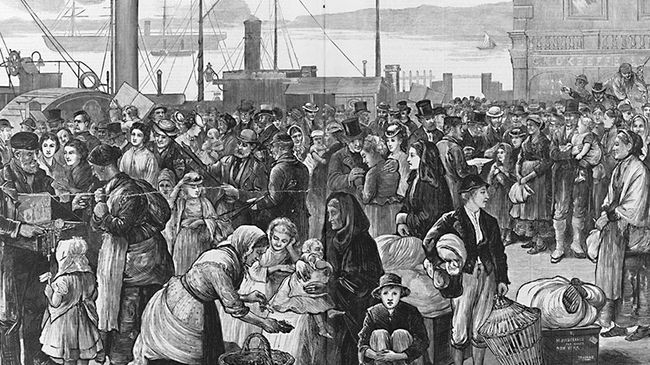Afterthoughts: The true origins of American immigration policy
Historians have long assumed that immigration policy in the U.S. began with federal laws to restrict Chinese immigration in the late 19th century. But it started before that — with the Irish.
January 8, 2024
Follow Berkeley Voices, a Berkeley News podcast about the people and research that make UC Berkeley the world-changing place that it is. Review us on Apple Podcasts.
Anne Brice: This is Berkeley Voices. I’m Anne Brice.
Historians have long assumed that immigration policy in the U.S. began with federal laws to restrict Chinese immigration in the late 19th century. But UC Berkeley history professor Hidetaka Hirota, author of Expelling the Poor, says it started before that.
Hidetka Hirota: In the 1840s and ‘50s, during a single decade, more immigrants came to the United States than in the previous seven decades combined, since the Revolutionary War. And many of those immigrants were Catholic, largely from Ireland.
Anne Brice: The main reason for the Irish coming to the U.S. was impoverishment of their homeland.
Hidetaka Hirota: Over the course of the first few decades of the 19th century, Ireland became extremely impoverished, mainly due to British colonialism over Ireland. Then there was a decisive event in the 1840s, which is called the Great Potato Famine. A potato blight hit Europe widely, but Ireland was hit the hardest. And the British government mismanaged the whole situation in ways that really aggravated the poverty of the Irish.
Anne Brice: As a result, more than 1 million people died, and over 1.5 million Irish immigrated to the U.S. American nativists took notice.
[Music fades out]
Hidetaka Hirota: Nativists were diverse people, actually, but more or less, they shared anti-foreigner sentiment. And then, more importantly, they were anti-Catholic, and many of the nativists were of Anglo descent. And those nativists believed that Protestantism really defined American society.
Anne Brice: A lot of Irish were unable to support themselves once they arrived in the U.S., so they entered public charitable institutions called almshouses. Nativists considered them burdens on American society.
Hidetaka Hirota: So the northeastern states, as a result, New York and Massachusetts, developed a series of passenger laws for restricting the landing of these impoverished immigrants. And Massachusetts, in particular, developed laws for deporting those already in the United States.
Anne Brice: And these early state laws actually laid the foundation for federal immigration law in the late 19th century, says Hirota.
[Music: “Respite” by Blue Dot Sessions]
Federal immigration policy developed on two different tracks, he says. On one track were general laws that restricted immigration of people considered undesirable — those who were poor, had contagious diseases or were contract workers. And on the other track were laws directed at the Chinese in particular.
Hidetaka Hirota: General immigration law was modeled on the existing state laws in northeastern states, and state immigration officials in New York and Massachusetts were actually involved in the making of this federal legislation.
So earlier laws in the northeastern states, these laws were invoked in conversations. (They said), “Look, those state governments had conducted immigration control. They had excluded the Irish paupers. So why don’t we do similar things to the Chinese as a national policy?”
[Music fades down]
Anne Brice: To sum it up: State immigration officials created laws in the northeastern states of the U.S. in the mid-19th century to keep out and deport Irish immigrants. These early state laws actually set the precedents for national immigration control that began decades later in late 19th century.
[Music comes back up]
To learn more, you can read Hirota’s 2017 book, Expelling the Poor: Atlantic Seaboard States and the Nineteenth-Century Origins of American Immigration Policy.
I’m Anne Brice, and this is Berkeley Voices, a Berkeley News podcast from the Office of Communications and Public Affairs at UC Berkeley. You can find all of our podcast episodes, with transcripts and photos, at Berkeley News at news.berkeley.edu/podcasts.
[Music fades out]

Historians have long assumed that immigration to the United States was free from regulation until the introduction of federal laws to restrict Chinese immigration in the late 19th century.
But UC Berkeley history professor Hidetaka Hirota, author of Expelling the Poor, says state immigration laws in the country were created earlier than that — and actually served as models for national immigration policy decades later.
This is an episode of Afterthoughts, a series that highlights moments from Berkeley Voices interviews that didn’t make it into the final episode. The following excerpt is from an interview with Hirota featured in Berkeley Voices episode No. 115: “They built the railroad. But they were left out of the American story.”